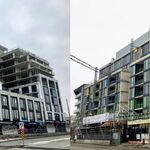brockm
Active Member
TREB historical sale prices are here. I have a 1953 number, but these numbers start at 1966. 1996 is the bottom of the trough after 1980s, and the lowest average price since 1987. For 1996 and 2011, I've put in brackets the ratio vs. 1953 numbers.
1953 average price $14424
1953 CPI 14.0
1996 average price $198150 (13.7X)
1996 CPI 88.9 (6.4X)
2011 average price $465412 (32.3X)
2011 CPI 119.9 (8.2X)
Most here would likely argue that 2011 represents an overvaluation of home prices. However, I would also argue that 1996 represents an undervaluation of home prices, vs. the general trend curve.
Either way though, you can see that home price increases in Toronto far outpace inflation, even when you're talking the bottom of the trough in 1996.
But since the underlying trend for the past three decades has been characterized by home price appreciation in excess of wage growth, what you're saying is you expect the general trend of people continuing to devote a greater and greater percentage of their income to housing the natural state of things.
One might wonder -- and I do -- at what point do these affordability levels reach a floor, where incomes simply can not sustain further appreciation relative to income. House price appreciation cannot indefinitely outpace inflation. The math doesn't work. So to affirm that we can expect a return to that underlying trend on an indefinite timescale is something which would strike me as a dangerous assumption.
If you use a 30-year trend line, then it appears that the mid-90s price appreciation was "below trend". But if you look at a 60-year trend line, then it appears the whole last 30 years are on a parabolic slope. On an income-to-price basis, it's downright insane.
The only thing which can possibly account for the disparity between income growth and the asset appreciation is the availability of credit. So if you want to hold the underlying price appreciation trend constant across time, then you also have to hold the trend that credit will keep becoming cheaper over time, too. And at some point, credit will become so cheap that banks will start paying people to borrow money at negative rates.
I think you see where I'm going with this; I wouldn't count on your long-term underlying trend.
Last edited:




